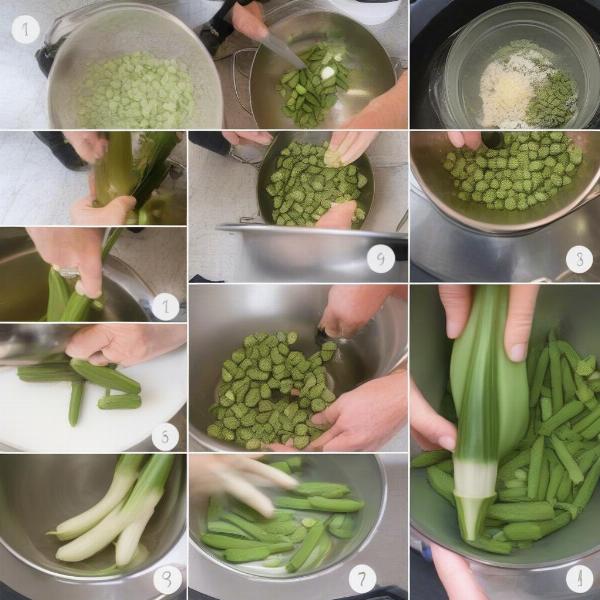Okra, also known as lady’s fingers, is a popular vegetable in many cuisines around the world. But can dogs eat okra? This is a question many dog owners ask, especially those who enjoy sharing their meals with their furry friends. This article delves into the safety and potential benefits of feeding okra to dogs, offering practical advice and expert insights to help you make informed decisions about your dog’s diet.
While okra is generally safe for dogs to consume, it’s crucial to prepare and serve it correctly. Raw okra can be slimy and difficult for dogs to digest, potentially causing digestive upset. Cooking okra, either by steaming, boiling, or grilling, eliminates the sliminess and makes it easier for dogs to digest. Avoid frying okra, as the added fats and oils can be harmful to dogs. Moderation is key when introducing any new food to your dog’s diet, including okra. Start with a small amount of cooked okra and monitor your dog for any adverse reactions, such as vomiting or diarrhea.
Okra for Dogs: Benefits and Risks
Okra is a nutrient-rich vegetable packed with vitamins, minerals, and antioxidants. It contains Vitamin A, Vitamin C, Vitamin K, and B vitamins, along with minerals like potassium and calcium. The fiber content in okra can also aid in digestion and regulate bowel movements in dogs. However, while these nutrients are beneficial, they don’t necessarily mean okra is a must-have in a dog’s diet. A complete and balanced dog food should provide all the essential nutrients your dog needs.
One of the potential risks of feeding okra to dogs is the presence of solanine, a compound found in the skin and seeds of okra. Solanine can be toxic to dogs in large quantities. Therefore, it’s essential to remove the seeds and skin before feeding okra to your dog. Furthermore, some dogs may be allergic to okra. If you notice any signs of an allergic reaction, such as itching, swelling, or difficulty breathing, after feeding your dog okra, discontinue feeding and contact your veterinarian immediately.
How to Prepare Okra for Your Dog
Proper preparation is crucial for ensuring your dog can safely enjoy okra. Here’s a step-by-step guide:
- Wash thoroughly: Wash the okra thoroughly under running water to remove any dirt or pesticides.
- Trim the ends: Trim off both ends of the okra pod.
- Remove the seeds and skin: Slice the okra lengthwise and carefully remove the seeds and skin.
- Cook the okra: Steam, boil, or grill the okra until it’s tender. Avoid frying, as the added fats and oils can be unhealthy for dogs.
- Serve in moderation: Start with a small amount of cooked okra and monitor your dog for any adverse reactions.
 Preparing Okra for Dogs
Preparing Okra for Dogs
Is Okra Good for Dogs With Diabetes?
Okra has been touted for its potential benefits in regulating blood sugar levels. While some studies suggest that okra may have a positive impact on blood glucose control, it’s important to note that these studies have primarily been conducted on humans, not dogs. More research is needed to determine the effectiveness of okra in managing diabetes in dogs. If your dog has diabetes, consult with your veterinarian before adding okra to their diet. They can advise you on the appropriate diet and management plan for your dog’s specific condition.
Okra and Dog Digestion: What You Need to Know
Okra is a good source of fiber, which can be beneficial for dogs experiencing constipation. However, too much fiber can also lead to diarrhea or other digestive issues. Therefore, it’s essential to introduce okra gradually and monitor your dog’s digestive health. If your dog has any existing digestive problems, consult with your veterinarian before adding okra to their diet.
Conclusion
In conclusion, dogs can eat okra, but it’s crucial to prepare it correctly and serve it in moderation. Cooked, seedless, and skinless okra can offer some nutritional benefits for dogs. However, it’s important to remember that okra should not replace a balanced dog food. Always consult with your veterinarian before making any significant changes to your dog’s diet, especially if they have any underlying health conditions.
FAQ
- Can puppies eat okra? Yes, puppies can eat okra, but it’s essential to introduce it gradually and in small quantities.
- What are the signs of okra allergy in dogs? Signs of an okra allergy in dogs can include itching, swelling, hives, vomiting, and diarrhea.
- Can I feed my dog fried okra? No, avoid feeding your dog fried okra, as the added fats and oils can be harmful.
- Is okra good for all dogs? While generally safe, some dogs may have allergies or sensitivities to okra.
- How much okra can I give my dog? Start with a small amount and monitor your dog for any reactions. Consult your vet for specific recommendations.
- Can okra help with my dog’s constipation? The fiber in okra can help with constipation, but too much can cause diarrhea.
- Is okra a necessary part of a dog’s diet? No, a complete and balanced dog food should provide all the essential nutrients.
ILM Dog is your trusted source for comprehensive and practical advice on dog care and nutrition. We offer expert guidance on everything from breed selection to health care, training, and nutrition. Whether you’re a new dog owner or a seasoned pro, ILM Dog is here to help you provide the best possible care for your furry companion. Contact us today for personalized advice! Email: [email protected], Phone: +44 20-3965-8624.